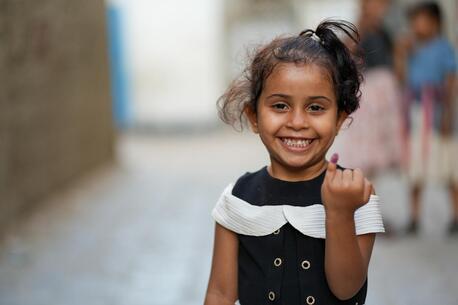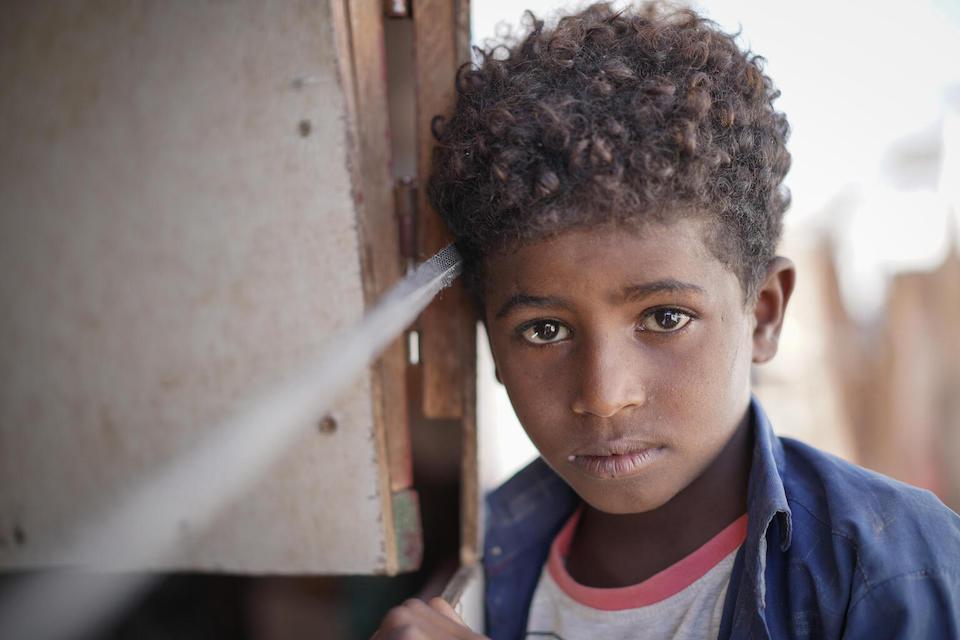
UNICEF in Yemen
UNICEF has been on the ground in Yemen since civil conflict began, leading the way to provide water, nutrition, education and protection to children and families and collaborating closely with partners to meet urgent needs.
War in Yemen: a crisis for children on multiple fronts
Millions of children are suffering in Yemen.
More than 21.6 million people — including over 11 million children — are in need of humanitarian assistance due to years of war inside the country, large-scale displacement and recurring climate shocks.
Yemen has become a living hell for children. Millions of parents don’t know if their children will survive from one day to the next.
"Yemen has become a living hell for children," said UNICEF Executive Director Catherine Russell. "Millions of parents don’t know if their children will survive from one day to the next."
Around 4.5 million people have been driven from their homes by violence. There is widespread food insecurity; an estimated 17.3 million people are experiencing high levels of acute food insecurity; in 2023, more than 288,000 children were admitted to UNICEF-supported therapeutic feeding centers suffering from wasting, which can be fatal if left untreated. There are regular outbreaks of cholera, measles, diphtheria and other vaccine-preventable diseases.

Yemen also continues to feel the effects of the COVID-19 pandemic, which strained an already fragile health system and further disrupted education for millions of children, leaving them increasingly vulnerable to exploitation and abuse.
Only 50 percent of health facilities are functional, leaving 20.3 million people without access to adequate health care. Many schools are damaged or closed, restricting access to education and threatening children's ability to learn and reach their full potential.
UNICEF's humanitarian strategy in Yemen focuses on delivering direct, lifesaving assistance and strengthening health and other systems to continue vital services and help meet basic needs.
How UNICEF is helping children in Yemen
UNICEF has been on the ground in Yemen since civil conflict began in March 2015, leading the way to provide water, nutrition, education and protection to children and families while collaborating closely with partners to meet urgent needs.
Millions of children and families depend directly on UNICEF for water, sanitation and hygiene services and support.
UNICEF scaled up its support to hospitals and health workers during the COVID-19 pandemic and continues to work with partners to improve the delivery of critical services, including routine immunizations.
Other priorities include:
- distributing soap and other personal hygiene supplies to prevent the spread of disease
- screening and treating children with severe acute malnutrition
- rehabilitating crumbling water and sanitation infrastructure while promoting climate-resilient development — including upgrading water systems to run on solar power, among other cost-effective, sustainable solutions
- repairing damaged schools, providing learning materials and otherwise increasing access to quality education in safe settings
- providing psychosocial and mental health services to children exposed to violence
- continuing distribution of humanitarian cash transfers, a program that has already helped thousands of impoverished families
The Yemen war's impacts on children and families are staggering. UNICEF is appealing to donors for support in order to meet the urgent needs of children and families in Yemen, still one of the world's worst humanitarian crises.
"I want to share the words of Sawsan, a 10-year-old Yemeni girl," Russell said: "'I believe in peace and hope that one day it will prevail in my country. We live in a war and no child is safe. I wish that one day the whole world will be filled with peace.'"